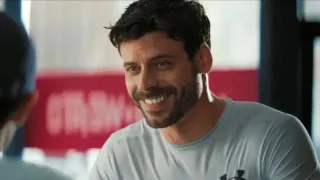September 15, 2020
Frameline Features, Part II: Queer Cinema's Maturity, Complexity
Brian Bromberger READ TIME: 14 MIN.
Having watched Frameline44's new roster of narrative features, what becomes increasingly evident is that queer cinema is maturing by bravely dealing with often taboo topics in inventive ways, creating not only better quality but thoughtful, even provocative movie-going experiences.
While the standard coming out story still surfaces, increasingly more films appear where being LGBTQ is not the main focus of the plot, but only one component of the more fascinating challenge of trying to be humane and loving in a complex, uncertain, and socially distant world. Themes from this year's lineup embrace social activism, refugees, surrogacy, grief, sex for pay, police brutality, parental abuse, and elderly sexual love, whether it occurs pre-Stonewall or just last month.
As they accomplished during the Depression and World War II, films can provide both a welcome respite from the grim news and disturbing issues of our day, as well as commentary and insights into dealing with those same problems. We can be introduced to new cultures, peoples, and perspectives that not only can make us more empathetic, but suggest insights into our own personal and communal struggles, as we realize how fragile and interdependent we are as human beings.
During this pandemic, films remind us how much we need to rely upon each other more than ever and give our neighbors the benefit of the doubt. So we continue our survey of the intriguing stories brought to us by Frameline 44, touching our hearts, expanding our minds, and increasing our compassion for each other, no matter who we are.
"Tunde Johnson departed this life 9:38 pm, May 28, 2020 at the hands of police officers in Los Angeles, California," are the ominous words introducing the centerpiece U.S. feature, The Obituary of Tunde Johnson, relating to police killing a gay black teenager. The hook here is that Tunde wakes up each morning with the incident of his cop inflicted death repeating itself in a time loop a la Groundhog Day.
Tunde (Steven Silver) is the son of very rich Nigerian ex-pat parents, attends an exclusive all white prep school, has a serious Xanax addiction, is having an affair with closeted star athlete Soren (Spencer Neville) who is in a relationship with Tunde's BBF Marley (Nicola Peltz).
The gimmick is that Tunde tries to change his circumstances each day but regardless he's still shot by the LAPD every night, even though he does everything right by not resisting and following their instructions.
Yet whether Tunde is growing or gaining any self-awareness is an open question. Certainly the film couldn't be more relevant to current affairs with African-Americans living daily with the possibility of experiencing police violence. Regrettably in the second half of the film, this burning issue becomes buried underneath the encroaching melodrama of the love triangle.
Also, during the last few years with the arrivals of Palm Springs, Happy Death Day, and Russian Doll, the once-innovative Groundhog Day twist is in danger of becoming trite. And one wonders how will audiences connect to such a fabulously wealthy and privileged character, unlike any of the deaths we hear about in the news.
The ambiguous ending will be debated by LGBTQ audiences. Based on a screenplay by Nigerian-born Stanley Kalu, which he wrote as a 19-year-old student at USC, this slightly over-hyped film is worth seeing for Silver's passionate performance and corroborating the somber reality of the all-pervading dangers of growing up black and gay in America today.
Surrogacy, friendship, same-sex weddings, and writer's block are all mashed together in the lighthearted San Francisco-based "Beautiful Dreamer," based on Patricia Cotter's play "The Surrogate." Margaret (Erin Daniels, "The L Word") can't finish writing her second novel, and her long-time partner Jen (Kathryn Smith-McGlynn) proposes marriage. Meanwhile, Margaret's best friend Billy (Louis Ozawa Changchien) and his wife Sarah (Jennifer Mudge) ask them to be godparents to their daughter, Tallulah, and their upcoming surrogate-birth son.
They've invited surrogate Crystal (Tate Moore) to spend her final pregnancy weeks with them, and, surprise, complications ensue. If Hallmark TV was in the business of making alternative family/surrogate movies, "Beautiful Dreamer" would be the result. Fortunately, the splendid Wendie Malick, as Jen's meddlesome mother, arrives in time to inject much-needed pizazz and comedy into the proceedings. At best a pleasant diversion that undoubtedly sounded better on the page than on its screen incarnation, with a few occasional laughs and one unexpected minor plot twist, otherwise you can predict after the first 20 minutes exactly how "Beautiful Dreamer" will end. Easy to like, but even easier to forget.
Finding where you belong in the world is the heart of the exquisite German film "No Hard Feelings," winner of this year's Teddy award for best feature. Parvis (luminous Benjamin Radjaipour), the son of exiled Iranian parents, is experiencing a haphazard summer, complete with steamy Grindr hookups and raves. He shoplifts and is sentenced to community service at a refugee shelter where he befriends displaced fellow Iranians brother Amon (Eidin Jalali) and sister Banafshe (Banafshe Arezu).
Parvis and Amon begin a first-love crush with the threat of the latter's deportation hanging over their carefree adventures. Both buoyant and tense, "No Hard Feelings" brings to the fore, in an emotional, unpreachy manner, the plight of refugees and the discrimination they endure. This affecting drama reminds us that no matter who we are or where we come from, we find our homes in each other. One of the hidden treasures of the festival.
Ferzan Ozpetek, the great Turkish-born Italian director of such LGBTQ classics as "Steam: The Turkish Bath," "Facing Windows," and "Saturn in Opposition," has given us another gift in "The Goddess of Fortune," regarding an aging gay couple, Alessandro (Edoardo Leo) and Arturo (Stefano Accorsi), who, after fifteen years together, have lost their passion for one another.
Their relationship is put to the test when their best friend Annamaria (Jasmine Trinka), facing a medical crisis in a hospital, must leave her two children in their care. They are obliged to deal with their own resentments, regrets, infidelities, and secrets as they possibly begin to forge a new family together.
Leo and Accorsi are both magnificent and totally believable as a couple searching for reasons to stay together. The film's mood swings from Fellini-like joie de vivre (especially in the opening gay wedding scene of their friends) to pathos, accomplished with humor and heart without becoming saccharine. Superlatives fail here in what may well be Ozpetek's masterwork. Discovering a jewel like "Goddess of Fortune" is the reason to attend film festivals.
There's a bit of deceptive advertising relating to "Rurangi," as it is being marketed as a feature film (and not only by Frameline) but is in reality an episodic (five 14-minute segments) television series from New Zealand, about a trans activist Caz Davis (Elz Carrad) who suffers a personal tragedy and returns to his rural hometown a decade after his transition. He has a prickly relationship with his father, who resents Caz for not attending his mother's funeral.
His best lesbian friend doesn't recognize him, but, despite feeling abandoned years ago, welcomes him back. Caz gets embroiled in an environmental fight dividing the town as well as perhaps reuniting with his ex-boyfriend, who is now questioning his sexuality. Kudos to newcomer trans actor Carrad, making a promising debut. There are numerous loose ends in the story, especially why Caz comes back to Rurangi, which aren't resolved, as presumably the series will return for a second season.
So if you like closure, this film won't appeal to you. However, indigenous Maori actors and culture, rarely depicted on screen, pervade the series, providing integral and two spirits-like elements to the plot. The script lacks the gravitas and exceptional writing caliber of "Transparent" or "Pose" here in the U.S., but it has an engaging quality that keeps you watching. By no means a home run, but a respectable double and worth a look. (Editor's Note: A later, differently-edited version of this film will be screened at Frameline44 on Saturday, September 26.)
The Dore Alley/Folsom Street Fair crowd haven't been forgotten at Frameline, and will relish the sexually explicit Brazilian entry, "Dry Wind." Factory worker bon vivant Sandro has secret trysts with co-worker Ricardo, but wants to remain unattached.
Then along comes a hot new arrival who chases Ricardo, producing jealous feelings in Sandro, who is compelled to reassess what kind of relationship he really wants. We're not talking Foucault here, but the film shows how sexuality in all its dangerous, occasionally squeamish diversity can bring couples together. On its own limited eye candy terms, "Dry Wind" has its erotic appeal and guarantees you will never look at fertilizer in the same way again.
With its spotlight this year on Taiwan, Frameline has chosen wisely with "The Teacher," concerning the travails of 26-year-old Kevin, who, when not advocating for marriage equality at rallies, is teaching Civics education to high school students and falling in love with an older man, Sam Chang, who is HIV positive.
A rumor starts at his conservative school that Kevin has AIDS, which threatens his job. He must also deal with his lover's ex-wife (Winnie Shih Ying Chang in a compelling, award-winning performance), who wants a child with Sam, divorce notwithstanding.
The film deftly avoids being histrionic. Taiwan became the first Asian nation to legalize same-sex marriage last year, yet, as this film documents, changing the law is different from transforming entrenched attitudes.
People realize who's gay, but they don't want to talk or hear about it, and LGBTQ people are pressured by their families and society to marry and have children. The Teacher shows the emotional price the country pays for maintaining this sham public conspiracy of cultural repression. Not flawless, but well-crafted and stirring.
A missing girl in a small rural Georgia town triggers memories of a lesbian's daughter's disappearance a year ago in the psychological thriller "Through the Glass Darkly" ("TTGD"). Still posting "Missing" signs, town outcast Charlie (Robin Lively) is pressuring the local police to make a connection between the two girls' vanishing, but they are resistant.
Charlie seeks refuge in the bottle, especially as her relationship with her partner Angela is falling apart amidst all the angst, and she must deal with painful secrets both from her own dark past, as well as those of the town.
An African-American woman reporter (Shanola Hampton) decides to help Charlie, hoping there's a big news story if the case is solved. Whether you like this movie depends on whether you buy into all the plot twists, especially one major revelation halfway into the story that relies on tricking the audience.
"TTGD" is chock full of Southern Gothic elements, reminiscent of Carson McCullers or Flannery O'Connor, using every imaginable Southern small-town stereotype. The film is proficient in exuding a white trashy ambiance so you can smell both the garbage and the moss in the air. Lively gives a tour de force portrayal of a grief-stricken woman's tentative grasp on reality. "TTGD" does hold the viewer's interest to the end, even if the all the shenanigans leading to the whodunit finale seem rather far-fetched.
In the second elderly lesbian film in the festival, 70-year-old recently widowed Claudina (Rosa Ramirez) moves into her daughter's and grandson's house in the Chilean drama "Forgotten Roads." She meets the married woman next door and they begin a romance. Claudina's daughter and the provincial Lautaro townspeople gossip and disapprove, but the introverted Claudina blossoms as she comes into her own, becoming involved in an underground, mostly queer club run by a gay childhood friend.
Unexplained UFO sightings in the town lead to cult-like rituals. This strange, unclassifiable movie, even at only 70 minutes, feels much longer. "Forgotten Roads" suffers from anemia, even with all the inner and outer turmoil. Unhappily, Claudina's sprightly liberation (complete with a graphic masturbation scene) doesn't give the film its desperately-needed jolt, regardless of Ramirez's brave portrayal; the biggest disappointment of the festival.
What initially seems to resemble a heartwarming ABC Afterschool Special turns darker in Lisa Donato's "Gossamer Folds." It's the suburbs of Kansas City, Missouri, circa 1986, and ten-year-old Tate Milikin (Jackson Robert Scott) has moved into a new home so his parents can salvage their troubled marriage.
In the next-door house lives a retired African-American English professor, Edward (Franklin Ojeda Smith), and his transgender daughter, Gossamer (Alexandra Grey), whom he insists on calling by his masculine birth name. Gossamer designs dresses for drag artists and dreams of escaping to New York.
After his father has an affair with a co-worker and moves out of the house, Tate (who is obsessed with learning new words in the dictionary) finds refuge and friendship with his neighbors despite his parent's wariness (especially the homo/transphobic father).
Another moving coming of age tale which works because the ace ensemble acting (especially the shimmering Grey and lovable curmudgeon Smith) makes the Mayberry-like setting realistic, so despite their disagreements you believe they are a family. It's an ideal drama to teach children about racism, transgender people, and the importance of celebrating differences in all people.
We seem to be enveloped in a fairy tale, but, like the Brothers Grimm stories, there are menacing shadows threatening any happily ever afters in Australian Monica Zanetti's "Ellie & Abbie (& Ellie's Dead Aunt)," based on her play. High school captain and wunderkind Ellie, goaded by affirmations from her online self-help guru, is trying to ask a girl classmate, on whom she has a crush, to the formal. Muddling her aspirations is the appearance of her dead aunt to give her advice on coming out and asking for that date.
The film concentrates as much on how and why her aunt died in 1986, with all its consequences for Ellie and her mother (the terrific Marta Dusseldorp) today, as it does about lesbian first love. Well-intentioned, but the fairy godmother magic you're hoping for never quite materializes, some scenes betray their stagey origins, and unless your EEG is flat-lining, the ending is readily apparent long before it occurs.
The whole here is not greater than the sum of its parts, but if the clich�d New Age aphorisms sprinkled throughout the film help teens accept themselves, then the innocuous "Ellie & Abbie" has fulfilled its purpose.
The pandemic, our partisan politics, or our apocalyptic global warming world getting you down? Then treat yourself to the Brazilian comic extravaganza "Alice Junior" ("Anna Celestino"), which will raise your spirits, like encountering a graphic novel come to life. Trans Alice has a popular advice vlog, a dad who loves and supports her, but when his job forces them to move to a rural southern town and attend a traditional Catholic high school with bullying classmates, her world seems to tumble down in humiliation.
Like a phoenix rising from the proverbial ashes, with new friends/allies, she uses her ingenuity and sass to change the people and culture around her. Featuring eye-popping animation and catchy pop tunes, this quirky, lively film even manages to revitalize the usual teen comedy stereotypes.
By the time you finish viewing "Alice Junior," like her, you will believe anything is possible as long as you have the right amount of love and determination. This whimsical, refreshing, fizzy treat is the best LGBTQ Brazilian film since 2014's "The Way He Looks," the country's entry for the Best Foreign Language Film Oscar. Yes, "Alice Junior" is that good, and an invigorating tonic for these morose days.
Frameline44 runs Sept 17-27. https://www.frameline.org/
Help keep the Bay Area Reporter going in these tough times. To support local, independent, LGBTQ journalism, consider becoming a BAR member.






